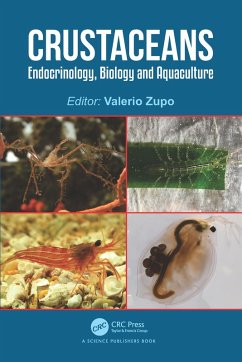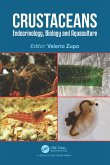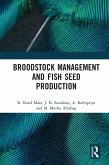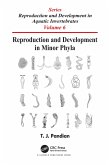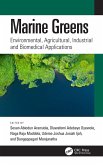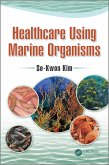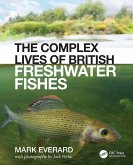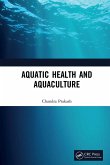Crustaceans (eBook, ePUB)
Endocrinology, Biology and Aquaculture
Redaktion: Zupo, Valerio
63,95 €
63,95 €
inkl. MwSt.
Sofort per Download lieferbar

32 °P sammeln
63,95 €
Als Download kaufen

63,95 €
inkl. MwSt.
Sofort per Download lieferbar

32 °P sammeln
Jetzt verschenken
Alle Infos zum eBook verschenken
63,95 €
inkl. MwSt.
Sofort per Download lieferbar
Alle Infos zum eBook verschenken

32 °P sammeln
Crustaceans (eBook, ePUB)
Endocrinology, Biology and Aquaculture
Redaktion: Zupo, Valerio
- Format: ePub
- Merkliste
- Auf die Merkliste
- Bewerten Bewerten
- Teilen
- Produkt teilen
- Produkterinnerung
- Produkterinnerung

Bitte loggen Sie sich zunächst in Ihr Kundenkonto ein oder registrieren Sie sich bei
bücher.de, um das eBook-Abo tolino select nutzen zu können.
Hier können Sie sich einloggen
Hier können Sie sich einloggen
Sie sind bereits eingeloggt. Klicken Sie auf 2. tolino select Abo, um fortzufahren.

Bitte loggen Sie sich zunächst in Ihr Kundenkonto ein oder registrieren Sie sich bei bücher.de, um das eBook-Abo tolino select nutzen zu können.
In this book, leading world scientists have pooled their excellence to provide vibrant and expert views of fundamental biological and physiological mechanisms involving crustaceans.
- Geräte: eReader
- mit Kopierschutz
- eBook Hilfe
Andere Kunden interessierten sich auch für
![Crustaceans (eBook, PDF) Crustaceans (eBook, PDF)]() Crustaceans (eBook, PDF)63,95 €
Crustaceans (eBook, PDF)63,95 €![Broodstock Management and Fish Seed Production (eBook, ePUB) Broodstock Management and Fish Seed Production (eBook, ePUB)]() K. Karal MarxBroodstock Management and Fish Seed Production (eBook, ePUB)54,95 €
K. Karal MarxBroodstock Management and Fish Seed Production (eBook, ePUB)54,95 €![Reproduction and Development in Minor Phyla (eBook, ePUB) Reproduction and Development in Minor Phyla (eBook, ePUB)]() T. J. PandianReproduction and Development in Minor Phyla (eBook, ePUB)50,95 €
T. J. PandianReproduction and Development in Minor Phyla (eBook, ePUB)50,95 €![Marine Greens (eBook, ePUB) Marine Greens (eBook, ePUB)]() Marine Greens (eBook, ePUB)142,95 €
Marine Greens (eBook, ePUB)142,95 €![Healthcare Using Marine Organisms (eBook, ePUB) Healthcare Using Marine Organisms (eBook, ePUB)]() Healthcare Using Marine Organisms (eBook, ePUB)52,95 €
Healthcare Using Marine Organisms (eBook, ePUB)52,95 €![The Complex Lives of British Freshwater Fishes (eBook, ePUB) The Complex Lives of British Freshwater Fishes (eBook, ePUB)]() Mark EverardThe Complex Lives of British Freshwater Fishes (eBook, ePUB)34,95 €
Mark EverardThe Complex Lives of British Freshwater Fishes (eBook, ePUB)34,95 €![Aquatic Health and Aquaculture (eBook, ePUB) Aquatic Health and Aquaculture (eBook, ePUB)]() Chandra PrakashAquatic Health and Aquaculture (eBook, ePUB)54,95 €
Chandra PrakashAquatic Health and Aquaculture (eBook, ePUB)54,95 €-
-
-
In this book, leading world scientists have pooled their excellence to provide vibrant and expert views of fundamental biological and physiological mechanisms involving crustaceans.
Dieser Download kann aus rechtlichen Gründen nur mit Rechnungsadresse in A, B, BG, CY, CZ, D, DK, EW, E, FIN, F, GR, HR, H, IRL, I, LT, L, LR, M, NL, PL, P, R, S, SLO, SK ausgeliefert werden.
Produktdetails
- Produktdetails
- Verlag: Taylor & Francis eBooks
- Seitenzahl: 308
- Erscheinungstermin: 23. Dezember 2022
- Englisch
- ISBN-13: 9781000820607
- Artikelnr.: 66264010
- Verlag: Taylor & Francis eBooks
- Seitenzahl: 308
- Erscheinungstermin: 23. Dezember 2022
- Englisch
- ISBN-13: 9781000820607
- Artikelnr.: 66264010
- Herstellerkennzeichnung Die Herstellerinformationen sind derzeit nicht verfügbar.
Valerio Zupo grew up as a marine biologist at the Stazione Zoologica Anton Dohrn, in a very fertile scientific environment corroborated by the presence of eminent scientists like R. Riedl, J. Romero, E. Fresi and L. Mazzella. His love for benthic ecology studies increased during a Fullbright fellowship at the Florida Institute of Technology and a Ph.D. at the University of Bruxelles. He cooperated with various institutes and centres in the world, from the Office of Naval Research (USA) to the University of Zurich, the Ben Gurion University in Israel, the University of Koeln in Germany, the University of Tasmania, the U.S. EPA, the UERJ in Brazil, the University of Barcelona in Spain, the Aix-Marseille University in France and many others, through a splendid scientific network that still produces plenty of exciting publications. He was a contract teacher for a course in Management of Marine Resources at the University Federico II of Naples (Italy) and served as a Unit Head at the Stazione Zoologica, for the production of model organisms for the scientific research. Dr. Zupo is a professional journalist and has published several books and hundreds of articles on various scientific topics, as well as for science dissemination. He is presently president of the International Society for Invertebrate Reproduction and Development (ISIRD) and has met various Nobel laureates during his career, providing motivation and hints, from Konrad Lorenz in Altenberg to Martin Chalfie and Tim Hunt that enriched the congress he organized in Italy, dedicated to the life rhythms of invertebrates. Presently, he is a researcher at the Stazione Zoologica Anton Dohrn of Naples and is associated with the department of eco-sustainable biotechnology. The passion of his life is a protandric shrimp exhibiting remarkable physiologic peculiarities, but his research spans from theoretical ecology to biodiversity issues, culture of sea urchins, global changes, ocean acidification, ecological modeling, chemical ecology, seagrass biology and aquaculture.
PHYSIOLOGY ISSUES. Crustacean Endocrinology: Fascinating Topic for
Biologists or a Peculiar Opportunity for Biotechnologies? A Historical View
with Functional Perspectives. Sexual Biology and Reproduction. Crustacean
Yolk Proteins: Structure, Function and Diversity. Infochemicals Recognized
by Crustaceans. Crustaceans as Good Marine Model Organisms to Study Stress
Responses by -Omics Approaches. ECOLOGY AND TAXONOMY. Crustacean Decapods
are Models to Describe the General Trends of Biodiversity According to
Ocean Acidification. Isopod Crustaceans as Seagrass Consumers: A
Mediterranean Perspective. Ecology and Ethology of Littoral Amphipods.
Ethology of Crustaceans Influencing their Ecology. Crustacean Ecology in a
Changing Climate. The Biodiversity of Freshwater Crustaceans Revealed by
Taxonomy and Mitochondrial DNA Barcodes. AQUACULTURE AND BIOTECH.
Crustaceans as Pathogens and Most Common Pathogens of Crustaceans.
Biotechnologies Linked to Crustaceans. Copepods vs. Salmons: Environmental
Treats for Crustaceans or Possible Eco-Sustainable Solutions? Automatic
Culture of Crustaceans as Models for Science. Current Issues on Freshwater
Crayfish Aquaculture with a Focus on Crustacean Welfare. Advanced Molecular
Biology Techniques Applied to Crustacean Aquaculture.
Biologists or a Peculiar Opportunity for Biotechnologies? A Historical View
with Functional Perspectives. Sexual Biology and Reproduction. Crustacean
Yolk Proteins: Structure, Function and Diversity. Infochemicals Recognized
by Crustaceans. Crustaceans as Good Marine Model Organisms to Study Stress
Responses by -Omics Approaches. ECOLOGY AND TAXONOMY. Crustacean Decapods
are Models to Describe the General Trends of Biodiversity According to
Ocean Acidification. Isopod Crustaceans as Seagrass Consumers: A
Mediterranean Perspective. Ecology and Ethology of Littoral Amphipods.
Ethology of Crustaceans Influencing their Ecology. Crustacean Ecology in a
Changing Climate. The Biodiversity of Freshwater Crustaceans Revealed by
Taxonomy and Mitochondrial DNA Barcodes. AQUACULTURE AND BIOTECH.
Crustaceans as Pathogens and Most Common Pathogens of Crustaceans.
Biotechnologies Linked to Crustaceans. Copepods vs. Salmons: Environmental
Treats for Crustaceans or Possible Eco-Sustainable Solutions? Automatic
Culture of Crustaceans as Models for Science. Current Issues on Freshwater
Crayfish Aquaculture with a Focus on Crustacean Welfare. Advanced Molecular
Biology Techniques Applied to Crustacean Aquaculture.
PHYSIOLOGY ISSUES. Crustacean Endocrinology: Fascinating Topic for
Biologists or a Peculiar Opportunity for Biotechnologies? A Historical View
with Functional Perspectives. Sexual Biology and Reproduction. Crustacean
Yolk Proteins: Structure, Function and Diversity. Infochemicals Recognized
by Crustaceans. Crustaceans as Good Marine Model Organisms to Study Stress
Responses by -Omics Approaches. ECOLOGY AND TAXONOMY. Crustacean Decapods
are Models to Describe the General Trends of Biodiversity According to
Ocean Acidification. Isopod Crustaceans as Seagrass Consumers: A
Mediterranean Perspective. Ecology and Ethology of Littoral Amphipods.
Ethology of Crustaceans Influencing their Ecology. Crustacean Ecology in a
Changing Climate. The Biodiversity of Freshwater Crustaceans Revealed by
Taxonomy and Mitochondrial DNA Barcodes. AQUACULTURE AND BIOTECH.
Crustaceans as Pathogens and Most Common Pathogens of Crustaceans.
Biotechnologies Linked to Crustaceans. Copepods vs. Salmons: Environmental
Treats for Crustaceans or Possible Eco-Sustainable Solutions? Automatic
Culture of Crustaceans as Models for Science. Current Issues on Freshwater
Crayfish Aquaculture with a Focus on Crustacean Welfare. Advanced Molecular
Biology Techniques Applied to Crustacean Aquaculture.
Biologists or a Peculiar Opportunity for Biotechnologies? A Historical View
with Functional Perspectives. Sexual Biology and Reproduction. Crustacean
Yolk Proteins: Structure, Function and Diversity. Infochemicals Recognized
by Crustaceans. Crustaceans as Good Marine Model Organisms to Study Stress
Responses by -Omics Approaches. ECOLOGY AND TAXONOMY. Crustacean Decapods
are Models to Describe the General Trends of Biodiversity According to
Ocean Acidification. Isopod Crustaceans as Seagrass Consumers: A
Mediterranean Perspective. Ecology and Ethology of Littoral Amphipods.
Ethology of Crustaceans Influencing their Ecology. Crustacean Ecology in a
Changing Climate. The Biodiversity of Freshwater Crustaceans Revealed by
Taxonomy and Mitochondrial DNA Barcodes. AQUACULTURE AND BIOTECH.
Crustaceans as Pathogens and Most Common Pathogens of Crustaceans.
Biotechnologies Linked to Crustaceans. Copepods vs. Salmons: Environmental
Treats for Crustaceans or Possible Eco-Sustainable Solutions? Automatic
Culture of Crustaceans as Models for Science. Current Issues on Freshwater
Crayfish Aquaculture with a Focus on Crustacean Welfare. Advanced Molecular
Biology Techniques Applied to Crustacean Aquaculture.
